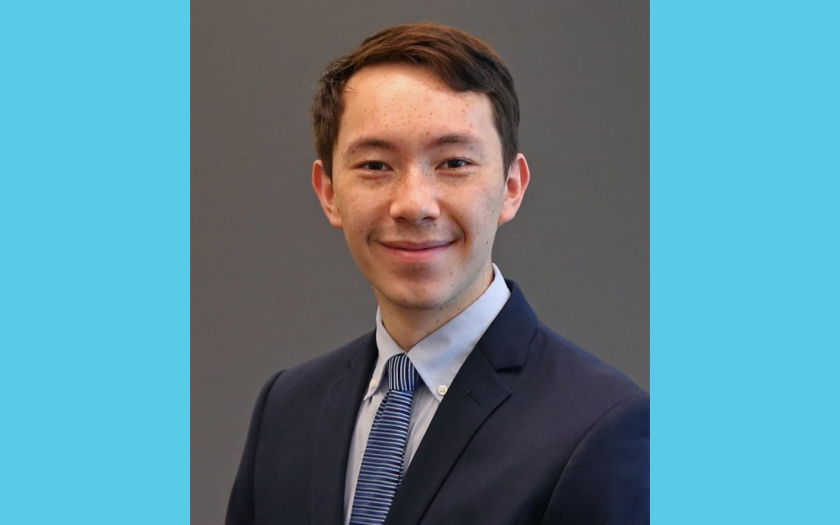June 2022 Alumni Spotlight - Gavin Mays ScM'22

Gavin Mays ScM'22
Srivastava Lab
Hometown: Sudbury, MA
Undergrad Institution: Rensselaer Polytechnic Institute (RPI)
Gavin is a recent graduate of the Biomedical Engineering master’s program. Before joining Brown in 2020, he studied Biomedical Engineering at RPI where he worked in the Mills Lab - a mechanical engineering lab that studies cell mechanical response to the ECM. Specifically, he studied how mechanical properties of in vitro 3D environments affect the behavior of plexiform neurofibroma Schwann cells. Gavin’s interest in cell mechanics led him to pursue a Master’s degree at Brown where he worked in Dr. Srivastava’s lab.
What projects did you work on for your thesis?
I am working on two projects: pH-regulating hydrogels and cell response to solid stress. For the pH-regulating hydrogels, we are trying to neutralize acidosis in the tumor microenvironment to alleviate some metastatic cell behaviors. Acidosis is known to increase cell invasion, modify proliferation rates, and reduce efficacy of immune cells. In particular we are interested in how chemotherapeutics are protonated and "trapped" in the extracellular space by acids. We are using pH-regulating hydrogels to neutralize acidic byproducts of cancer metabolism to reduce rates of chemotherapeutic ion trapping. This will allow weak base chemotherapeutics to readily enter cancer cells in solid tumors, increasing drug efficacy. I specifically contributed towards the sterilization of gels, toxicity testing of gels, and demonstrating pH-dependent efficacy for chemotherapeutics with and without pH-regulation.
For the other project, we are trying to provide experimental data to fit a mathematical model developed by Jun Zhong, a postdoc in Dr. Srivastava’s lab, for cell spreading on pre-stretched substrates. Currently people have studied how cells respond to different substrate stiffnesses and cyclic stretching but there aren't many studies that consider modeling cell spreading on pre-stretched substrates. We are making substrates of varying stiffnesses and seeding cells before and after a stretch is applied to examine cell morphology. For this project I made the substrate stretching devices, helped characterize substrates, and developed a protocol to seed and image cells on these substrates.
What was your favorite class at Brown?
I think my favorite class at Brown was Drug & Gene Delivery with Dr. Mathiowitz. To be honest, I didn't understand most of what was talked about in the class for the first half semester because it was very heavy on polymer and microparticle fabrication and how to trap drugs. I liked this class because it made me really buckle down and study to earn the A in the class and I came out feeling like I had knowledge of a subject I had never previously considered (material science). Dr. Mathiowitz was also very animated and excited for each class which was very refreshing to see.
What are your plans after graduation?
After I graduate I'll be going to Yale to join Jay Humphrey's lab. I will be studying vascular biomechanics in the context of many disease states (e.g. Marfan's Syndrome). I don’t know exactly what I will be working on yet but I am excited for the chance to study experimental tissue mechanics. It will definitely be a breath of fresh air after focusing on cancer cell biology for so long. Currently the lab is composed entirely of 12 post-docs and I will be one of the first new generation of PhDs for Dr. Humphrey since he stepped down from his department chair position. I wanted to do a PhD to broaden my job opportunities when I finish school. Ideally I'd like to work as a project manager in R&D when I graduate and I think having a PhD will help me achieve that. I want the experience of managing a project from conception to completion that can often be found when pursuing a PhD.
Do you have any tips for the PhD application process?
When applying to a PhD, I would recommend starting early and understanding each school is looking for something slightly different. Assuming you are submitting applications in the fall semester, I would advise having a list of schools/labs you are interested in finalized in the summer and a draft of your statement of purpose document written. Know what you are interested in and what kind of work you would like to do over a 5-year PhD. Over the summer you should email the labs you are interested in to express interest and ask if they are taking in new PhD students. Having contacted labs before applying REALLY helps the application process, as these labs will then remember to look for your name and application package when it is time to decide.
If you were to redo your Masters program, is there something that you would have done differently?
If I were to redo my M.S. program, I would like to participate in more social events. Dr. Gray and the other administrative staff do a very good job of organizing events and I should have gone to more of them. I suppose I got into the habit of not going early on when all of the events were over zoom. I would definitely recommend new students go to these social events. I also wouldn't have taken Continuum Mechanics (just kidding!).